Channel of contention: what triggered the Suez Crisis in October 1956
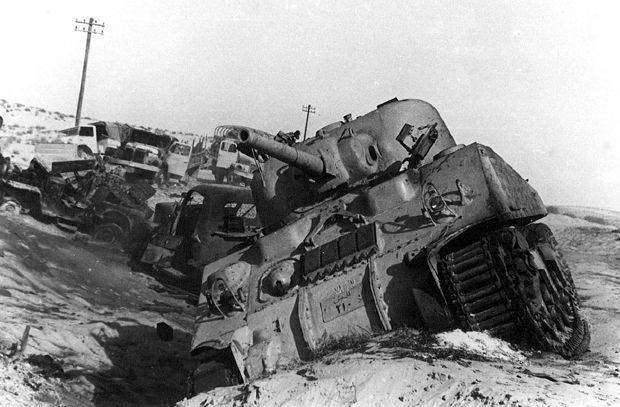
How did one of the most characteristic military-political conflicts of the Cold War era originate and develop?
October 29 this year marks 59 years since the beginning of the war, which went into history the second half of the twentieth century under several names: the Second Arab-Israeli War, the Anglo-French-Israeli War against Egypt, Operation Kadesh, Operation Musketeer and the Hundred-Hour War. But this little war did not exist on its own, but was part of the events that went down in history as the Suez Crisis. And not by chance: after all, it was the Suez Canal, one of the world's most important transport arteries, that was the stumbling block, the small fragment of rock that caused a real collapse in world politics.
The fighting of all parties involved in the Suez crisis was short-lived: it began on October 29, 1956, and actually ended on November 6, when the armistice agreement was signed. But against this background, the preface to the Hundred-Hour War looks all the more protracted: in fact, it all began in 1952, when Colonel Gamal Abdel Nasser, organizer of the Revolutionary Command Council and Free Officers movement, one of the leaders of the 1952 revolution in July, came to power in Egypt .
But the appearance of President Abdel Nasser was only a catalyst of events, and not their cause — there were many such reasons. In fact, the foundations of the Suez crisis that erupted in October 1956 can be summarized in five groups. First of all, there were purely internal Egyptian reasons, which, in turn, were more or less tied to the confrontation of Egypt with Britain and France and its confrontation with America. The fourth group - but perhaps the first in importance! - relations between Egypt and Israel were strained to the limit. And, of course, one should not discount the fifth group of reasons: the growing influence of the Soviet Union in the Middle East.
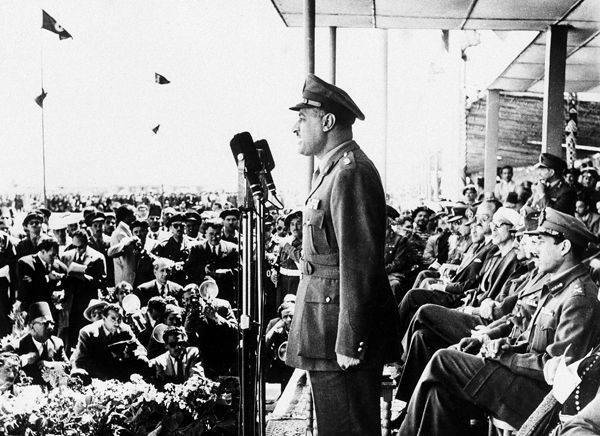
Egypt is rushing to the top
Domestic Egyptian reasons have a common name that has not lost its relevance to this day: nationalism. Despite the fact that in the 1922 year, Egypt, which had managed to visit a colony of both France, and the Ottoman Empire, and Great Britain, gained nominal autonomy, and in 1936, the real one, the influence of the largest European powers on the country's policy remained enormous. What is not surprising, given the strategic position that occupied and occupies Egypt on the world map.
One of the most important objects on the territory of Egypt was and remains the Suez Canal - the most important transport artery connecting the Old World with Hindustan and the countries of Southeast Asia. It was not by chance that he became the object of fierce fighting in both the First and Second World Wars. And it was also not by chance that after 8 in May 1945, the UK continued to keep its troops there. The Anglo-Egyptian treaty at the beginning of 1950 stipulated that the British military would remain in the channel zone until the end of 1956, and this period could even be extended.
Of course, for a country that had become one of the informal leaders of the anti-colonial movement on the Black Continent and one of the symbols of the liberation movement, the presence of foreign troops on its land seemed unacceptable. In addition, it was clear that the Suez Canal brings to its owners enormous revenues that would have come in very handy to the newborn Egyptian republic. Finally, the long history of being in the role of a colony literally pushed the radical political forces of Egypt - and they constituted the most influential grouping on the country's political map - to the most decisive actions.
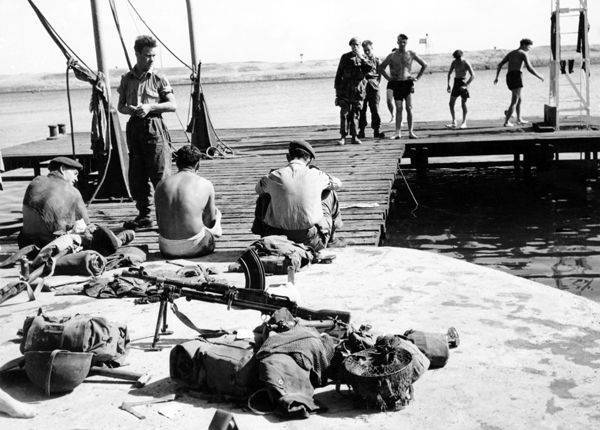
Paris and London vs Cairo
The desire of Abdel Nasser himself and the radical political forces that supported him to oust the traditionally most influential players from the Middle East — Britain and France — from the very beginning condemned the countries to escalating tensions. The first began to show dissatisfaction with the French. The new Egyptian government quite frankly provided political patronage and direct support to the rebels in the French colonies - primarily in Algeria, as well as Morocco and Tunisia.
Moreover, it was Paris that at that time was one of the most faithful and consistent allies of Tel Aviv, relations with which at Cairo deteriorated with catastrophic speed. Suffice it to say that in 1954, France and Israel signed a secret agreement for the supply of the latest French weapons to the Israelis. The arrival of this military equipment quickly became known to Egyptian intelligence, which added fuel to the confrontation between Cairo and Paris.
Finally, France and the United Kingdom were the monopoly owners of the Universal Company of the Suez Canal Sea. The French owned a controlling stake - 53%, to the British (after a scandalous scam on buying out shares from Egyptians, which was turned in 1875 by British Premier Benjamin Disraeli) - 47%. They did not intend to tolerate such a state of affairs in the new revolutionary Cairo.
And in London it was well understood. And they not only understood: the British soberly assessed the causes of the sharp deterioration of the crime situation around the canal and the English contingent associated with it. The frequent cases of attacks by Egyptian radicals on military units and individual soldiers of England, abductions of military and technical specialists - all this was clearly one of the components of the growing pressure from Cairo on London, the ultimate goal of which was to push Britain out of control of the channel. And when 26 on July 1956 of the year President Nasser declared that the Egyptian government embarked on the nationalization of the Suez Canal, the war in October of the same year was already inevitable.
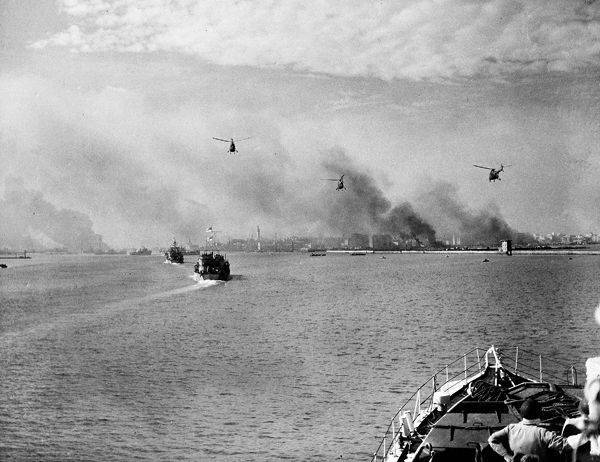
American recipe: incite and stop
It should be noted that the United States, which in the finals of the Suez crisis played the role of the main peacemaker, to no small degree had a hand in its inception. It can be said that the October 1956 war on the Sinai Peninsula and its completion became one of those traditional operations for America in the future to create a crisis advantageous to America and to receive political and economic dividends on its resolution. In fact, it was America’s position that played the role of a detonator in the development of the situation with the idea of nationalizing the Suez Canal by Egypt.
His interest in the new Egypt, which was built by Colonel Nasser, and his desire to take control of the process was shown by the United States back in 1953, when US Secretary of State John Foster Dulles arrived in Cairo. The most important goal of this high visit was the need to convince Egypt to join the Baghdad Pact - the union of Great Britain, Iraq, Iran, Pakistan and Turkey. Formally, the British were the initiator of the creation of the pact, and the Americans were not even de jure participants, but it was Washington that most actively promoted the idea of this union and de facto was included to all its main committees.
It was this union, which consisted of a third of the NATO member states, that the US emissaries tried to persuade Egypt to join. But President Nasser outlined the possible entry into the Baghdad Pact with a number of significant conditions for his country. First, he insisted on providing financial assistance to the Egyptians in the construction of the Aswan Dam, a structure that would allow Egypt to solve the most important energy, climatic and agricultural problems at once, strengthening its independence. Secondly, Cairo, who constantly felt insecure alongside Tel Aviv, which is gaining strength, demanded that America supply weapons.
With the first condition in Washington reluctantly agreed. With the second one: relations with a strategic partner - Israel - turned out to be more important for the United States than relations with Egypt. Egyptians also did not have to count on the acquisition of weapons from England and France, and they went the only way that remained free: to the countries of the Warsaw Pact. To say that this step has caused outrage in Washington is to say nothing. Entirely embroiled in an armed confrontation with the USSR and its allies, the United States could not forgive Cairo for such an act. And in the end, at first they stopped issuing loans for the construction of the Aswan Dam, and on July 19 refused to issue them at all. A week later, at a rally in Alexandria, President Abdel Nasser spoke the words that became the immediate cause for the start of the war: “Americans, choke with madness! The annual income of the Suez Canal Company is 100 million dollars. Why don't we ourselves get this money? ” On the same day, Egyptian troops occupied the canal zone. Three days later, on October 29, Israel went on the attack.
What was afraid of israel
However, Israel had no particular choice. From the very moment of its creation, the Jewish state in the Middle East caused a categorical rejection on the part of its Muslim neighbors, and above all, Egypt. Cairo was one of the leaders of the Middle East coalition of Arab countries, with which Tel Aviv had to wage a war of independence in 1948 year - the first in a long line of Arab-Israeli wars. And Cairo with might and main supported and directed the activities of fidain terrorists, who had been causing a lot of problems to the Israelis since 1955.
In addition, despite repeated demands from Britain, France and the UN to grant Israeli ships the right to pass through the Suez Canal, Egypt has never responded to these calls. In fact, this meant the blockade of Israeli shipping in its coastal waters, which could not but have a negative effect on the economic situation in the country.
Another step Cairo, which actually caused a panic in Israel, was the decision to buy weapons from the Eastern bloc. By this time, Israeli-Soviet relations were in deep crisis, Tel Aviv was increasingly cooperating with members of the NATO bloc, and such a move by the closest neighbor could not help scare the Israelis. In addition, it was clear (and soon documented by the Mossad intelligence agencies) that the most modern military equipment, clearly superior to those of Israel, would come into service with the Egyptian army from the Warsaw Pact countries. And accordingly, after some time that the Egyptian army will need to master these samples, it will become much stronger than the Israeli one. This circumstance called into question not only the continued presence of Israel in those territories of the Palestinian state that it managed to capture during the 1948 war of the year, but also the very fact of the existence of a Jewish state.
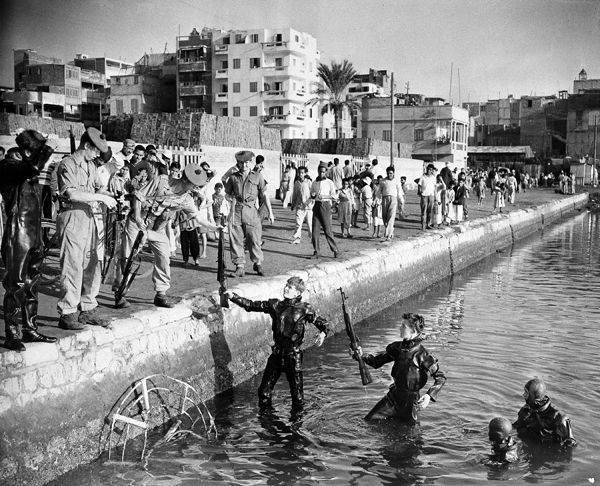
Moscow goes for broke
And these fears of Israel were not in vain. By the middle of 1950, the Soviet Union had already made considerable efforts to significantly strengthen its influence, as well as its political and military presence in the Middle East. Having failed in its attempt to subjugate Israel to its influence, Moscow has switched to more compliant Muslim countries that have been involved in the decolonization process. First, it fully fit into the concept of exporting socialism, which was followed by the Soviet regime. Secondly, the expansion of the number of satellite countries in the Middle East allowed Moscow to maintain parity with America, with anxiety over the creation of its own system of allies in the same region and staking on Israel. Finally, the active presence in the region provided the Soviet Union with a permanent market for weapons, and therefore long-term contracts for their service, as well as a unique testing ground for testing new types of equipment in real combat conditions.
In practice, it looked like this. In 1955, after America, and after it Britain and France and Britain refused to supply arms to Egypt, Cairo turned to Moscow and its allies for help. The Egyptians met and until the end of that year, through the mediation of Czechoslovakia (de jure it was she who sold this equipment), a significant amount of weapons and military equipment was sent to North Africa. In total, Egypt received weapons worth $ 250 million. On the extensive list were 230 tanks T-34-85, 200 armored personnel carriers, 100 self-propelled guns Su-100, about 500 field artillery barrels, 200 fighters, bombers and transport aircraft - primarily modern MiG-15bis and Il-28, as well as destroyers, torpedo boats and underwater boats.
In such conditions, Tel Aviv had no choice but to prepare for a preemptive strike and look for allies in the West. And the growing influence of the Soviet Union in Egypt and the neighboring Muslim countries only accelerated and simplified this process, which inevitably led to the beginning of a new war.
Hundred hour war
This war broke out on the evening of October 29 1956, starting with the bold operation of Israeli paratroopers: almost 400 890 battalion of the 202 battalion of the Airborne Brigade under the command of Rafael Eitan landed near the Mitla Pass. The very next day, the Israelis entered into a battle with the Egyptians, and by November 5 Israel managed to capture the entire Sinai Peninsula. On October 31, Anglo-British bombing began, and on November 6, the Allied troops landed in the Suez Canal area without meeting resistance.
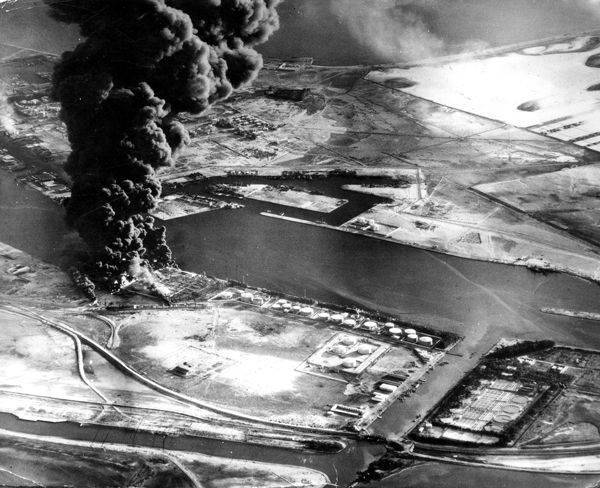
These combat operations were preceded by several rounds of top-secret negotiations between Britain, Israel and France, during which the Allies elaborated detailed plans for a war with Egypt. Its goal was to return to the Franco-British control over the Suez Canal and change the government in Cairo: a man much more loyal to the West was to replace Colonel Nasser.
But the successful development of the military operation of the British, Israeli and French troops was hindered by the joint efforts of two irreconcilable enemies - the United States and Russia. The Americans acted primarily by diplomatic means, organizing pressure on the parties to the conflict through the United Nations and its General Assembly. It was during the active phase of the Suez Crisis that the UN first voiced and almost immediately realized the idea of applying Peacekeeping forces, which already on November 15 of 1956 of the year — that is, nine days after the signing of the armistice agreement — began to be deployed in the Suez Canal zone.
Moscow, in turn, staked on military pressure, realizing that after the suppression of the insurgency in Hungary (in which the UN also tried to intervene, but failed), it could not count on the success of diplomacy. On November 5, Soviet Foreign Minister Dmitry Shepilov sent a telegram to the Secretary of the UN Security Council in which, under the threat of direct military assistance to Egypt, he demanded that the fighting be stopped during the 12 hours and Israeli forces were withdrawn from Egyptian territory within three days. The telegram noted that the USSR was ready to immediately send to aid the “victim of aggression” divisions of the naval and air forces, ground military units, as well as volunteers, instructors and military equipment. On the same day, in the evening, special messages were received by the heads of government of England, France and Israel, whom the USSR officially warned of its readiness to crush the aggressor and restore peace in the Middle East using force, including using “rocket technology” and atomic weapons.
software
The actions of Moscow and Washington had the result. By December 1956, all British and French soldiers had left the conflict zone, and by March 1957, the Israelis had left the occupied lands in Sinai. The geopolitical situation in the region has not changed; none of the parties to the conflict has received any new territorial acquisitions, except that Israel has achieved freedom of navigation through the Suez Canal and the Strait of Tiran. The political situation has changed dramatically. On the one hand, both the United States and the USSR proved the validity of claims to political influence in the region - and have since ceaselessly strengthened it. On the other hand, the UN has proved its political weight, and the practice of using peacekeeping forces has since become constant.
On the third hand, Egypt and its President Nasser became political heavyweights, which strengthened anti-colonial tendencies in Africa and the East - and at the same time for a long time buried the idea of a peaceful settlement in the regions. After ten years of constant small-scale fighting between Egypt and Israel, the Six-Day War broke out, turning into a war of attrition, and after six more the Doomsday War. And this is not to mention the wars of independence, which have been raging on the Black Continent for another ten years and have led to the appearance on its map of several points of constant military-political tension and endless conflicts. However, each of them has its own separate history and its own prerequisites, which are no longer directly related to the causes of the Suez crisis.
- Sergey Antonov
- http://rusplt.ru/world/kanal-razdora-chto-sprovotsirovalo-suetskiy-krizis-v-oktyabre-1956-goda-19468.html
Information